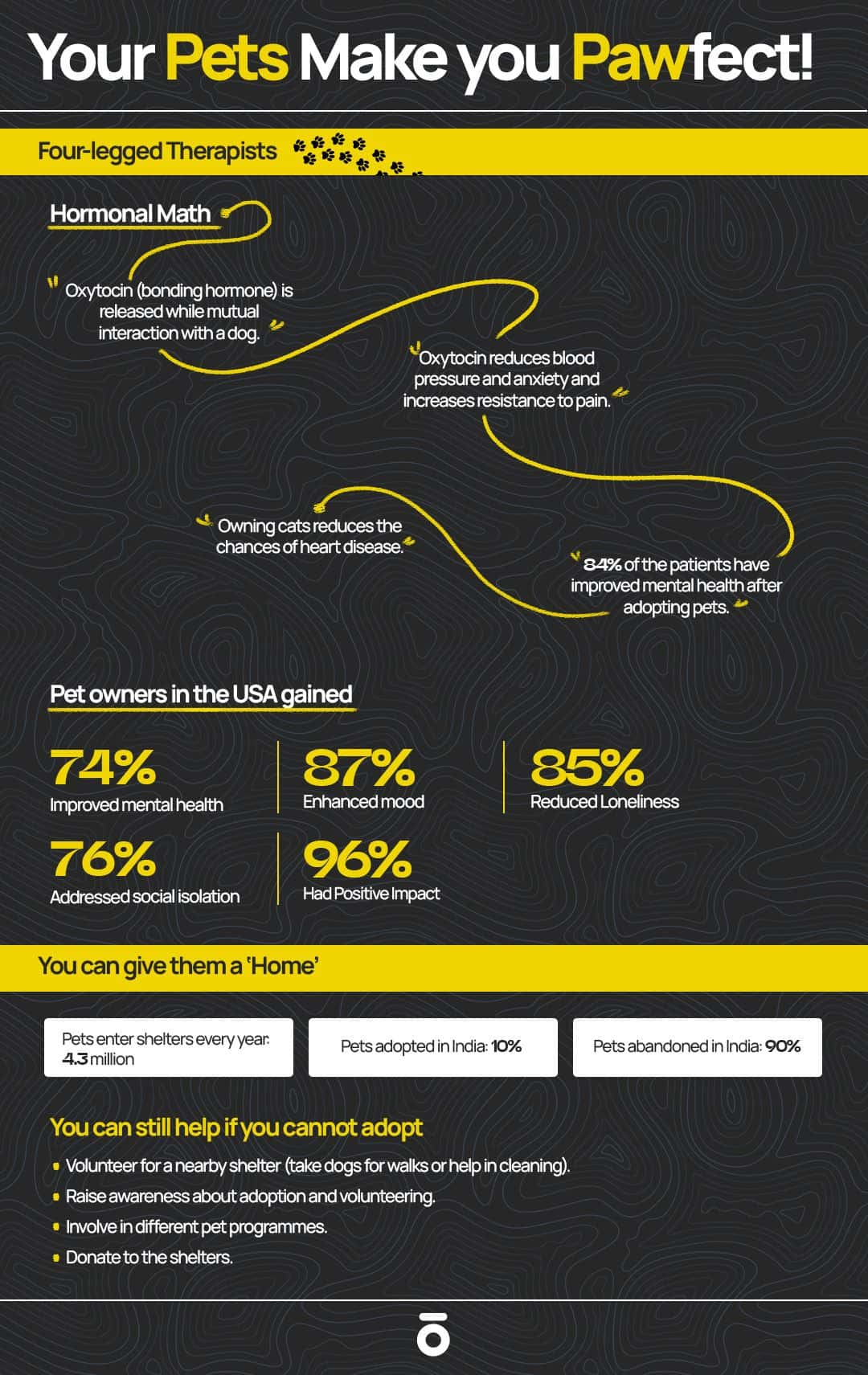Why Should You Get a Pet? The Benefits of Having Pets at Home

Introduction
Remember when you used to wait eagerly for your parents to come home after work? Now, you live alone, and when you return home, all you see is an empty room. Remember when you could talk to your siblings and friends about how your day went? They are busy in their own lives, and you probably have a better chance of meeting Amitabh Bachchan than meeting them. Remember when you wanted to take THAT little kitten home because it was raining outside, but you weren’t allowed to?
Almost all of these questions have only one answer: pets. Pets come in all shapes and sizes, but one thing is for sure: they are the best solution to all problems. In the era of nuclear families and super-competitive social connections, pets are the only beings who do not care about who we are or what we do for a living.
But it is weird that a being that does not earn, requires constant attention, cannot cook, cannot clean makes our lives so much easier! Why? How? Let’s figure it out!
Pets Help Us. But Just How Much?
Let’s talk about the benefits of getting yourself a pet. We usually associate pets with companionship, but there’s so much more to it than just that.
Pets can improve your mental health, reduce stress, and even boost your physical well-being. They encourage regular exercise, whether it's through walks or playtime, and provide a sense of purpose and routine. Pets can help lower anxiety, combat loneliness, and even improve social connections. In short, having a pet isn’t just about having a furry friend—it’s about enhancing your quality of life in ways you might not have expected.
- Exercise - Picture this. It’s already 10 pm. You just had dinner in front of the TV. As you are disassociating from reality into the comfort of your own cocoon in the living room, you feel something soft nudge your leg. It’s your furry roommate wagging his tail at you. Time for a walk.
When we take care of a pet, mostly a dog, we need to be mindful of their needs. Looking after a dog demands a lot of physical energy. You need to play with them, engage with them, and of course, the mandatory walks and pee and poop breaks. This, in turn, gives you the walks you need, and in the end, you end up wondering, “Who needed it more”?
- Reduces stress levels - Various studies have found that interacting with your pets can lower cortisol levels, which is your body’s natural stress hormone. It has also been shown to raise the levels of “feel-good” hormones like oxytocin, dopamine and serotonin. Naturally increasing feel-good chemicals in your brain can help you feel happier, less stressed and anxious.
In an age when many people look for quick fixes for their stress and anxieties, caring for a pet and spending time with it is a much more wholesome alternative.
- Lowers blood pressure and cholesterol - Pets are great for your heart. Li-te-ra-lly.
Research suggests that interacting with animals can lower blood pressure and improve heart health. Researchers from the University of Minnesota found that individuals who had never owned a cat were 40% more likely to die from a heart attack than those who had owned cats at some point in their lives.
So, you are statistically less likely to die from a heart attack (or heartbreaks) if you have pets. The next time you get annoyed at all the fur over your clothes, just remember this fact and give your pet a treat.
-
Companionship - For your pets, you are their entire world. They offer comfort, support, and a sense of companionship. In a time when people are becoming more isolated, pets are a reason to look forward to each day. If you struggle with mental health issues, they give you the motivation to get out of bed and face the world.
-
Improve overall quality of life - Pets help you to build healthy routines and habits. You probably may feel too lazy to go for a walk or even cook yourself a decent meal. But your pets depend on you for sustenance and other basic needs.
When you take them for a walk or make sure that they get some exercise, you are also subjecting yourself to physical exertion. When you wake up on time in the morning to make sure your pet gets food or water, you are also helping yourself by getting up on time and building healthy habits.
- Gets you out of the house - Ever since Covid, a majority of people have transitioned to remote work. Remote work can sometimes get a little too comfortable. You can get food or basically anything simply ordered to your place.
You are in the comfort of your home, and really, there’s no point leaving it, right? However, this can encourage a sedentary lifestyle, which is both physically unhealthy and detrimental to your overall well-being.
Pets need companionship—some more than others. And when they do, it's a good reminder that you need to get out of the house, too. Time to socialize!

Things to keep in mind before you go for it
-
Time—Your pet needs this most important and non-negotiable thing from you. Understand that your needs and priorities must make room for them. Pets don’t fit into your schedule—they become a part of it.
-
Do your research—Take your time and do your research before you adopt. (Adopt; please don’t shop!) If you are looking for a dog, understand what breed would be most suitable for you to care for. Consider the dog's temperament, physical needs, and the amount of physical and mental stimulation it requires.
-
Make sure that your home is ready - There could be a world of inconspicuous hazards hiding inside your home that could be toxic to your dogs or cats. If you have a habit of leaving your hair curler lying around, maybe it’s time to change that!
Not just that, but if you are thinking of getting a high-energy dog, make sure you have enough space to accommodate them and keep them active and happy.
- Be patient- Any pet you bring into your home will always need time to adjust. Whether it’s a new puppy, a rescue reptile, or a rodent, it will need time to settle in, learn your routines, and feel comfortable.
The same goes for you; adapting to the responsibilities and changes that come with having a pet takes time. With patience and consistency, both you and your pet will find your rhythm.
-
Financial readiness - Getting a pet is a significant commitment, and it's important to be prepared for the costs. Beyond the initial adoption or purchase fee, you'll need to consider regular expenses like vet appointments, vaccinations, medications, food, grooming, and emergency care. Unexpected costs, such as accidents or illnesses, can arise at any time, so it’s wise to have a financial cushion set aside.
-
Adjust your expectations—understand that your pet may not show love in the way you expect. Every animal is unique. A cat may not behave like a dog, a turtle won’t act like a bird, and a fish probably won’t even acknowledge your presence. Just as you’re different, so are your pets.
-
Have a vet on speed dial - Make sure you choose a veterinarian who is close to your home and who is updated on all your pet’s health checkups and vaccinations. It's also important that your pet feels comfortable with them, so make sure your pet actually likes the vet! Please!

Conclusion
We’re always in a rush to streamline our lives to make everything easier. Taking on the responsibility of a pet can feel overwhelming at first. But maybe it’s worth looking at it from a different perspective. When we open our homes to a pet, we’re not just adding to our to-do list—we’re inviting a source of joy, connection, and love into our lives.
The benefits of their companionship are endless. If only we could take a moment and put their needs above our own, we’d realize just how much they enrich our lives in ways we never imagined.


Debunking Exercise Myths – What’s Effective and What’s Not

A Guide to Hormonal Health and Well-Being

Intense Workouts: Common Myths and the Real Facts


